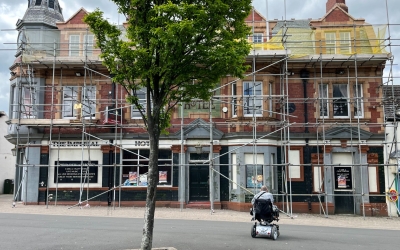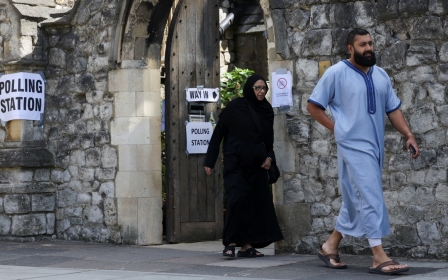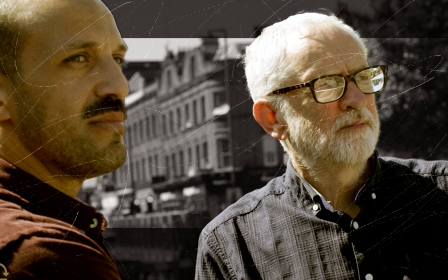UK election 2024: Jeremy Corbyn beats Labour challenge to retain London seat

Former Labour Party leader Jeremy Corbyn has been re-elected as an MP, winning almost 50 percent of the vote in Islington North, the London constituency he has represented for more than four decades after standing as an independent.
"Palestine was on the ballot," the veteran left-winger and lifelong pro-Palestine campaigner told Middle East Eye. "And I promise to stay true to my word to stand up for the Palestinian people and their right to self-determination."
An MP since 1983, Corbyn led Labour from 2015 to 2020, but was barred by the party from standing as a candidate and then expelled when he announced his intention to run anyway.
He nonetheless won 49.2 percent of the votes (24,120) in Islington North to win the seat for the 11th time. Labour candidate Praful Nargund, a local councillor, was second with 34.4 percent (16,873).
In a statement issued after the result was confirmed early on Friday, Corbyn said his victory was a warning to Keir Starmer's incoming Labour government "that dissent cannot be crushed without consequences".
New MEE newsletter: Jerusalem Dispatch
Sign up to get the latest insights and analysis on Israel-Palestine, alongside Turkey Unpacked and other MEE newsletters
Starmer, who moved Labour sharply to the right after succeeding Corbyn as leader, will become the party's first prime minister since 2010, with an expected majority of 170 seats following a collapse in support for the governing Conservatives across the country.
"This result is, to me, a resounding message from the people of Islington North that they want something different, they want something better," Corbyn said in his victory speech.
'The people of Islington North, like most people in Britain, couldn’t give two hoots for the opinions of representatives of the political class that doesn’t give two hoots about them'
- James Schneider, political organiser
'They're also looking for a government that on the world stage will search for peace, not war, and not allow the terrible conditions to go on that are happening in Gaza at the present time."
In the lead up to the election, polls had suggested that Corbyn - whose team of volunteers had started the campaign without any data - might lose the seat as an independent, and Labour redirected resources and campaigners into Islington North to try and secure victory.
On the day of the vote, Tom Watson, deputy leader of the party under Corbyn, and Patrick Heneghan, a former Labour official accused on the basis of leaked messages of sabotaging Corbyn's chances in the 2017 election, were pictured canvassing for Labour in Islington North.
Former Labour leader Neil Kinnock, who lost the 1987 and 1992 elections, also went out in Corbyn's seat to campaign against him, as did Labour lord Peter Mandelson, Margaret Hodge and the former Corbyn supporter and journalist, Paul Mason, who had hoped to be Labour's candidate.
James Schneider, Corbyn's former director of communications, told MEE: "People trust Jeremy because they know he won’t waver from his principles. They know Keir Starmer is an unprincipled liar. Corbyn’s steadfast support for justice for the Palestinians marked him out as someone the people of Islington North could trust to stand up for them and their interests."
"Labour tried to flood the seat with their so-called big wigs," Schneider said. "It didn’t work. The people of Islington North, like most people in Britain, couldn’t give two hoots for the opinions of representatives of the political class that doesn’t give two hoots about them."
During his victory speech after winning in Islington North, former Labour Party leader Jeremy Corbyn dedicated his win to the people of his constituency. pic.twitter.com/jvcslhBACe
— Middle East Eye (@MiddleEastEye) July 5, 2024
Corbyn was elected Labour leader in 2015 after the party lost the 2015 election to David Cameron's Conservatives.
Under Corbyn, Labour enjoyed a surge in left-wing support as it adopted anti-austerity policies and campaigned on traditional social democratic and socialist issues.
The British political landscape was shaken by the 2016 Brexit referendum, which Cameron had promised in his 2015 manifesto. The UK voted to leave the European Union, opening up divisions in both major parties, with the Tories initially particularly split over the terms of Britain's departure from the bloc.
In the 2017 general election, Corbyn's Labour won 40 percent of the popular vote - far higher than Starmer's 2024 share - denying the Conservatives an outright majority but failing to remove them from government.
But in a Brexit-dominated election in December 2019, Labour was comprehensively defeated by Boris Johnson, who had taken over from the wooden Theresa May as Conservative leader and prime minister and ran on the promise to "Get Brexit done". This message resonated in traditionally Labour-supporting seats that had voted for Brexit.
Corbyn stepped down as leader and was then expelled from Labour and had the parliamentary whip withdrawn by his successor Keir Starmer in October 2020 after saying that claims of antisemitism in the party during his time as leader had been "overstated" for political reasons.
Though he was readmitted to the party as a member in November 2020, it refused to let him continue as a Labour MP.
In March, Labour's national executive voted by 22 to 12 to prevent him from standing as a candidate , with no right of appeal.
Corbyn announced he would stand as an independent when the election was called on 24 May, after which Labour expelled him from the party.
Speaking to Middle East Eye last week, Corbyn said that he planned to continue campaigning for "social justice, human rights and the environment" regardless of the result.
"I will continue campaigning, carry on writing, carry on doing all the things I've always done. I'm as you know very young and got a lot of energy in me to do all that campaigning and that will never disappear or go away."
Corbyn is among a number of independent candidates elected in constituencies previously held by Labour where opposition to the party has been fuelled by criticism of its failure to call for an immediate ceasefire in Gaza until months into Israel's war with Hamas.
Middle East Eye delivers independent and unrivalled coverage and analysis of the Middle East, North Africa and beyond. To learn more about republishing this content and the associated fees, please fill out this form. More about MEE can be found here.





